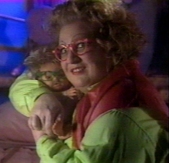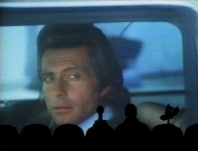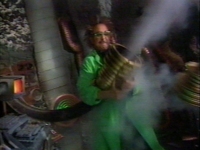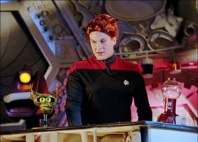
|
Episode 706- Laserblast Movie: (Note: "Leonard Maltin's Movie and Video Guide" gives "Laserblast" two-and-a-half stars. Was he, or one of his editors, thinking of "The Apprenticeship of Duddy Kravitz," or "Rio Bravo?" We'll never know.)
This causes (again, I think) the stupid stoned cops to share a breakfast burrito. Billy, meanwhile, develops what doctors refer to as an "extremely gross chest hole" and so visits Roddy McDowall, even though he is not explicitly playing a chest hole specialist. Roddy digs around the kid's bad chest make-up and fishes out something hard, so Billy lies in wait for him that evening and murders him, again, with his laser cannon.
This causes (now I don't even know what "this" refers to) Billy to make love to his girlfriend, if that's what you call what he does to her, and then turns green and scares her. Bill Bixby-guy goes to Keenan Wynn's house while Eddie Deezen and pal drive around and Billy shoots a pinball machine and runs into the desert where he shoots some guys in a plane and murders them. Deezen and his patent attorney (or friend -- never explained) drive around a lot, so Billy stumbles onto the road and murders them. (This is, ostensibly, our hero here doing all the unwarranted murdering, even though it is never even hinted at that possession of the laser cannon causes such behavior. No, this is all Billy, our scrawny, Lance Kerwin/Shawn Cassidy/Christopher Atkins lead, whom we're supposed to like!) Soon, a hippie van driver picks him up and helpfully offers to drive him to his desired destination, so he murders him. Suddenly and with no connecting scene, I swear, Billy is on some deserted back lot shooting things. The turtles come and kill him. Things left hanging: 1. Who the Hector P. Valente is Keenan Wynn supposed to be playing, how does he fit in and
why? (or where? Or whatever?) Answer to all of the above: "Laserblast" was not a blast of any kind, and did not
live up to its two-and-half star Leonard Maltin hype. Segment 1: Dr. Forrester loses his funding (he had funding?) and so unceremoniously cuts the SOL loose of its umbilicus. It will, he points out, drift through the endless void of space and probably fall into a black hole, where all will die horribly. He really seems quite unconcerned about it, despite having been slavishly devoted to this experiment for seven years, seemingly expressly and maniacally bent on world domination. Still, I suppose, no fundy-y, no world domination-y. He tells them he plans to move in with his mother to "save scratch." (His mother, by the way, has turned momentarily into a "virile female," as the cigarette marketeers like to say.) Segment 2: A "nomad-type" satellite, one of the many that buzz around the cosmos demanding perfection from their hapless victims, comes aboard the SOL. They toy with it mercilessly, getting it to whining pretty heavy, before tossing it casually out the airlock. (There's an airlock? Paid for by Dr. F's "funding," I guess.) Segment 3: They run into a field of, I don't know, "grazing" star babies and one of them grabs the SOL and won't let it go. It is determined that he has a dirty diaper, so Crow and Servo are shot out the airlock (they have one, remember?) to change it. With Mike instructing them from within -- wearing a vest now, chain-smoking and slurping old, bad coffee, assuring them that failure, which might seem to them like a perfectly viable option, is not one, in fact -- they manage to finish the messy space diaper change-out, and are momentarily (for three movie segments) safe. Segment 4: As predicted, they do manage to drift near a black hole, and that is not
good. Only a calm, clear-headed Mike can save them from imminent matter-collapsing death. He shows up dressed as
one of the more famous fictional female starship commanders and, after uttering a bunch of space nonsense, he saves
them and celebrates by singing an obscene version of "Proud Mary." (Yes, I know, they're all obscene,
and this is simply one of them.) Segment 5: They arrive at the edge of the universe and turn into pure energy (or something
pure, they never really say what), which looks suspiciously like some small, gel-covered hand-held lights being
reflected by a beam splitter. Dr. Forrester, in the meantime, is having a meal much like a lunch one might expect
to have at a "2001: A Space Odyssey" theme restaurant. Soon, and probably inevitably, he sees himself
as an old man, transforms into a star baby and is plucked out of the air by mother Forrester who says, "Another
chance to do it right. Isn't it wonderful, baby?" The baby, instead of saying, "Ga," or perhaps,
"Bllllrr," responds by saying, "Oh, poopie."
As far as the prologue, with the "beyond Thunderdome" joke, was this perhaps an excuse for us to clear out one of those writing room jokes, where, whenever someone tossed out a movie joke that made reference to that film, another writer would stand up and confront her, saying, "Now come on, Mary Jo, we've been through this -- can't we just get beyond Thunderdome?" Perhaps it was. Okay, not perhaps. That's precisely what it was. Having the robots tie up Mike so that they can deliver their bad joke: pretty cowardly, I know. But it got it out of our systems. Until the next pervasive writing room joke came along. Probably the one where a writer turns to another one out of the blue and says, "Oh, shoot. I'm sorry -- I didn't mean to turn you on." Trace as the old man in the final segment was in fact Trace's "old man," Jack Beaulieu, a very nice, quite dignified fellow who, though always enthusiastic about our doings, seemed appropriately perplexed about what it all might mean. That's why it was such a coup to have him on the show. It was, for us, like getting Alistair Cooke or something -- finally, a touch of class around the place. Mike Nelson  Very funny
movie. There were a lot of highlight moments, it seems to me; I used to love it when we were presented something
like the deputy who (in our minds) resembled Hank Williams Jr. That gave us the ideal chance to beat the "ready
for some football" line into the ground. If you did it right, that sort of thing wasn't boring; it could become
more funny as it went along. Did we do it right here? I'll leave that to the judgment of history. Very funny
movie. There were a lot of highlight moments, it seems to me; I used to love it when we were presented something
like the deputy who (in our minds) resembled Hank Williams Jr. That gave us the ideal chance to beat the "ready
for some football" line into the ground. If you did it right, that sort of thing wasn't boring; it could become
more funny as it went along. Did we do it right here? I'll leave that to the judgment of history.
One of my favorites, over a shot of the deputy looking disgusted: "Well, just another example of a citizen who isn't READY FOR SOME FOOTBALL!" And then a little twist: "Well, I gotta go, all my rowdy friends are coming over tonight." The main thing I think about when I consider the end of the Comedy Central years is the departure of Trace Beaulieu. Trace is one of the most charming, generous, funny people I've ever known. When the last show was done, when our little endeavor seemed, in fact, to be all over, he gave me a postcard I still have on my fridge. It's a wonderful photo -- from maybe the 1920s -- of a race car driver in one of those old bullet-style cars. He's on an old dirt road, some sparse audience visible in the background; he's looking over to his left, his hair blown back in an image simultaneously of speed and comic surprise; and what he's seeing is his left rear tire, which has just left its axle and is bounding by him on the road. It's a sublime moment of "Hey, what the --!!!" On the back, Trace wrote that it sure was nice working on the puppet show with me. And it was, too; from my end, doubly. Thank you, Trace. Paul Chaplin  Memories
light the corners of my mind. I was asked to share my reflections on Episode 706, and Chris and Brian sent me a
tape to review. I had a vague recollection that I had watched thousands, perhaps even hundreds of miserable movies
during my tenure at MST, and "Laserblast" sounded somewhat familiar. You could have told me that we had
done a film entitled "Martians From Manila" and that would have sounded vaguely familiar too. That's
how trauma works. Your mind blocks it out so you can go on with your life. It was not until I actually saw "Laserblast"
again that it all came back to me...misty water color memories. Memories
light the corners of my mind. I was asked to share my reflections on Episode 706, and Chris and Brian sent me a
tape to review. I had a vague recollection that I had watched thousands, perhaps even hundreds of miserable movies
during my tenure at MST, and "Laserblast" sounded somewhat familiar. You could have told me that we had
done a film entitled "Martians From Manila" and that would have sounded vaguely familiar too. That's
how trauma works. Your mind blocks it out so you can go on with your life. It was not until I actually saw "Laserblast"
again that it all came back to me...misty water color memories.
Did anyone notice that this was a really, really bad movie? The lead guy, Kim Somebody, is another sterling example of how filmmaking is not a meritocracy. The fact that this film was even made proves that "anybody can do it." You can find this either inspiring or depressing. And the Mike-as-Captain-Janeway segment...oh, dear. I was unable to look at Mike in that costume (actually, I was never allowed to look at him; he wouldn't permit it.). Yet I couldn't not look at him. Mike is a very masculine man sort of guy person, and it was very unsettling to observe him out of character, yet still in costume. I can vividly recall him standing around the craft services table on shoot day, wig and boobs on his very mannish body, with its mannish walk and gestures, discussing baseball with Kevin, Paul and Jeff Stonehouse, all with a disconcerting nonchalance. It was a severe bout of cognitive dissonance. Jeff Stonehouse, videographer, dear friend and all-around great guy, loved the challenges that segments like the last one presented. Having Mike and the Bots turn into pure energy, and thus little colored light beams, was painstaking. Until Stonehouse came on board, the camera work was pretty perfunctory and we were locked into our low tech. As for the Deep 13 part of the last segment, we had a lot of conversations about doing multiple camera angles and watching it now, used as I am to the single camera shoot, it's strange to see. But I think it reflected -- as did the material itself -- how everything was up in the air for MST at that point. Roderick McDowall was in this movie. I can't think about that too much. Not because I'm stupid -- although that does play a part in it -- but I have loved Roddy McDowall since I was 13 years old and I don't want to consider the possibilities of why he may have had to do this movie. At one point during the Sci-Fi Channel years, we had Leonard Maltin as a special guest on an episode. Mr. Maltin is a walking warehouse of film and Hollywood knowledge, and he's great fun to talk to. I got the chance to ask him if he'd ever met Roddy McDowall. He said yes, that he knew him, and that Roddy McDowall was one of the last, true gentlemen of Hollywood. When McDowall dies, Maltin said, all of Hollywood's secrets go with him. McDowall died later that year. And that was Episode 706 of our truncated season. We had no idea of what the future was for MST. I went to Los Angeles to be in a play, and my compeers worked on other projects for Best Brains, which unfortunately never came to fruition. Memories may be beautiful and yet, what's too painful to remember we simply choose to forget..."Laserblast." So it's the laughter we will remember, whenever we remember, the way we were. Mary Jo Pehl
It had been the best experience of my life. And I was determined not to tamp it down and head out to LA to become a development whore or sit in a room writing bad comedy for someone else. Living in Silver Lake, throwing pencils at the ceiling with a bunch of goateed Harvard losers and grinding away on the next episode of Monkeyshit Follies was my idea of Hell. I had already decided to stay, because I have a soul, and souls don't grow "Out There," as William Goldman calls it. I got into television because I loved creating stuff for it, not because the money was good or I thought L.A. was "neat." I'd rather stay here and get a job scraping zebra mussels off the hulls of fishing boats. So I had already made up my mind that I would remain. I would hold my days at MST among the best of my professional life, and look back fondly while moving forward and beyond. And we still had some work to do and a place to do it. It would be a long dry spell, for sure. But then one day we found out about a lovely man named Barry Schulman who lived in a cable network in midtown Manhattan... Kevin Murphy
|
| All content contained within this Episode Guide is copyright © 2001 by Chris Cornell and Brian Henry. Please do not reproduce this guide or any portion thereof in any form without express written permission from the copyright owners. |
 A
guy with a green face has a thing on his arm, so some shell-less turtles in a spaceship start shooting at him.
(I can only guess that "so," and not "and," is the conjunction I'm looking for in this case.
There appears to have been some causal connection between the two events.) Because of that, a young, supernaturally
unappealing kid who looks like Lance Kerwin with swollen eyelids wakes up with a start and, consequently, his mother,
who is thin and that's about it, leaves for Acapulco. That event, it seems, causes the puffy-lidded ur-Kerwin to
drive to an insane Keenan Wynn's house and make him angry. Therefore, (I think) two cops sit on a dirt road smoking
weed. This in turn causes Kerwin Man, who they call "Billy," to drive by in excess of the posted speed
limit, causing the bulbous cracker cop to issue him a THC-induced ticket. He drives to a gas station and is soon
accosted by Eddie Deezen and his friend, or business partner, or realtor, or Amway sponsor (it's not made clear
which it is). Because of Deezen's teasing, Billy drives into the desert and looks around. He soon finds the discarded
"thing" that the green-faced guy dropped when he was incinerated by the space turtles. He picks it up
and, like any red-blooded named-Billy-person, begins pretending it's a gun, mock shooting and saying "pow-pow!"
and "Dow, da dow pow!" (Pow? Obviously, he momentarily forgot that he wasn't playing one of Sister Woman's
brood in a bad 1959 community theater production of "Cat on a Hot Tin Roof.")
A
guy with a green face has a thing on his arm, so some shell-less turtles in a spaceship start shooting at him.
(I can only guess that "so," and not "and," is the conjunction I'm looking for in this case.
There appears to have been some causal connection between the two events.) Because of that, a young, supernaturally
unappealing kid who looks like Lance Kerwin with swollen eyelids wakes up with a start and, consequently, his mother,
who is thin and that's about it, leaves for Acapulco. That event, it seems, causes the puffy-lidded ur-Kerwin to
drive to an insane Keenan Wynn's house and make him angry. Therefore, (I think) two cops sit on a dirt road smoking
weed. This in turn causes Kerwin Man, who they call "Billy," to drive by in excess of the posted speed
limit, causing the bulbous cracker cop to issue him a THC-induced ticket. He drives to a gas station and is soon
accosted by Eddie Deezen and his friend, or business partner, or realtor, or Amway sponsor (it's not made clear
which it is). Because of Deezen's teasing, Billy drives into the desert and looks around. He soon finds the discarded
"thing" that the green-faced guy dropped when he was incinerated by the space turtles. He picks it up
and, like any red-blooded named-Billy-person, begins pretending it's a gun, mock shooting and saying "pow-pow!"
and "Dow, da dow pow!" (Pow? Obviously, he momentarily forgot that he wasn't playing one of Sister Woman's
brood in a bad 1959 community theater production of "Cat on a Hot Tin Roof.") Upon
finding a necklace near the site, the laser cannon, as the thing turns out to be, begins to work, so he blasts
saguaros for a while, still making a "pow" sound even though the laser cannon is producing its own superior
version. Soon, in a scene which takes up only four or five minutes of screen time, but expands, like one of those
paper thin sponges that blows up on contact with water, to 478 hours, his thin Sondra Locke-ish girlfriend looks
for him. Frankly, the scene should have been trimmed to 344 hours and perhaps given a point. After finding him,
though, something quite unbelievable happens -- they go to a dull party, and stay there for 6,803 hours, every
second of it filmed. After his girlfriend is roughed up by Deezen and friend at the party, Billy does the honorable
thing and hangs around, skulking in the bushes like a coward, until his nemeses leave and then attempts to murder
them with his new found laser cannon. He only manages to blow up their car, which causes a severe Bill Bixby-type
fellow in a Botany 500 suit to drive into town and investigate.
Upon
finding a necklace near the site, the laser cannon, as the thing turns out to be, begins to work, so he blasts
saguaros for a while, still making a "pow" sound even though the laser cannon is producing its own superior
version. Soon, in a scene which takes up only four or five minutes of screen time, but expands, like one of those
paper thin sponges that blows up on contact with water, to 478 hours, his thin Sondra Locke-ish girlfriend looks
for him. Frankly, the scene should have been trimmed to 344 hours and perhaps given a point. After finding him,
though, something quite unbelievable happens -- they go to a dull party, and stay there for 6,803 hours, every
second of it filmed. After his girlfriend is roughed up by Deezen and friend at the party, Billy does the honorable
thing and hangs around, skulking in the bushes like a coward, until his nemeses leave and then attempts to murder
them with his new found laser cannon. He only manages to blow up their car, which causes a severe Bill Bixby-type
fellow in a Botany 500 suit to drive into town and investigate. Bill
Bixby-guy investigates about as competently as a guy in a tan synthetic suit can, but he's coming up with far less
than Bill Bixby's "Magician" would have in similar circumstances!
Bill
Bixby-guy investigates about as competently as a guy in a tan synthetic suit can, but he's coming up with far less
than Bill Bixby's "Magician" would have in similar circumstances!

 Despite
imminent unemployment, we had fun with this episode, and I was finally able to fulfill my lifelong desire to dress
up as Kate Mulgrew (aka Mrs. Columbo). It is a small comfort to me that no matter how talented the make-up artist,
how good the costume, how expert the lighting, I don't look anymore like a woman than Fred Gwynn does, without
make-up.
Despite
imminent unemployment, we had fun with this episode, and I was finally able to fulfill my lifelong desire to dress
up as Kate Mulgrew (aka Mrs. Columbo). It is a small comfort to me that no matter how talented the make-up artist,
how good the costume, how expert the lighting, I don't look anymore like a woman than Fred Gwynn does, without
make-up. So
there we were, eating a cake shaped like the MST logo and drinking as much Summit Pale Ale and Sam Adams as we
could put down. This was it. After seven seasons, one hundred twenty-eight shows (correct me if I'm wrong), two
live shows, a convention, three agents, four network presidents, two entire network ownership shifts, two major
cast changes, endless awards, accolades, press junkets, Penn Gillette, lawsuits, upheavals, pain, agony, joy, heartburn,
cigars, alcohol and approximately seven hundred and fifty-three billion occasions for laughter, we were eating
logo cake and emptying beer bottles.
So
there we were, eating a cake shaped like the MST logo and drinking as much Summit Pale Ale and Sam Adams as we
could put down. This was it. After seven seasons, one hundred twenty-eight shows (correct me if I'm wrong), two
live shows, a convention, three agents, four network presidents, two entire network ownership shifts, two major
cast changes, endless awards, accolades, press junkets, Penn Gillette, lawsuits, upheavals, pain, agony, joy, heartburn,
cigars, alcohol and approximately seven hundred and fifty-three billion occasions for laughter, we were eating
logo cake and emptying beer bottles.